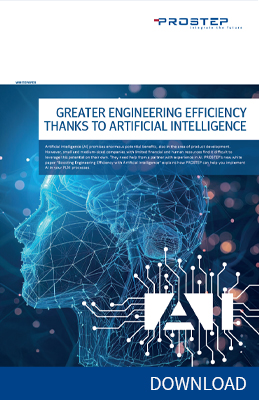
Digital Thread and the associated challenges were the overall focus of PROSTEP INSIGHT DAYS 2023.
In our online event, we gave you an insight into our current range of solutions and consulting services.
Our PLM experts explain strategies for achieving continuity across the digital thread and mastering digital consistency in your company. They show you what digital continuity means in terms of data sharing and management with partners and suppliers and present the future direction of the PROSTEP product family.
Our consultants explain the challenges and concepts of digital product development. They show you how sustainable PLM architectures are structured and how you can launch a successful PLM initiative.
You can find the recordings of our event here.
Session 1: Strategies for Achieving Continuity Across the Digital Thread
What defines digital consistency across the digital thread? We examine how the past manual approaches to managing data across different systems in the past led to data silos and how modern integrations help to ensure data consistency. We outline the difficulties of product development planning and introduce ways to maintain control over data baselines across domains utilizing integration with OpenCLM. Using NASA’s Mars Rover as an example, wel explore the integration capabilities of OpenPDM, recognize how a new product requirement is imported, and how OpenCLM and OpenPDM can be used to enable digital consistency.
Contact
Mirko Theiss
mirko.theiss@prostep.com
Session 2: Mastering Digital Consistency with Partners and Suppliers
We answer what digital continuity means in terms of data sharing and management with partners and suppliers and examine current approaches and best practices. How do our product solutions, OpenDXM GlobalX, OpenPDM, and OpenCLM function within your Product Lifecycle Management (PLM) process and how do they aid in maintaining digital continuity with partners and suppliers?
Contact
Daniel Wiegand
daniel.wiegand@prostep.com
Session 3: PROSTEP Product Roadmap
Product managers present the future direction of the PROSTEP product line including OpenPDM, OpenCLM, OpenPDM CCenter, OpenDXM GlobalX, and others. Learn about the upcoming enhancements and integration options that will be available to you.
Contact
Daniel Wiegand
daniel.wiegand@prostep.com
Rainer Zeifang
rainer.zeifang@prostep.com
Mirko Theiss
mirko.theiss@prostep.com
Session 4: Designing for Consistency - Strategies for Achieving Digital Continuity Across the Digital Thread
Our expert from PROSTEP presents future product development and the capabilities of cross-domain and cross-enterprise connectivity using OpenPDM, OpenCLM, and OpenDXM GlobalX. You gain valuable insights and learn how PROSTEP can advise and support you in redesigning your PLM architecture to enable the digital thread.
Contact
Brian Schouten
brian.schouten@prostep.com
Session 5: Digital Product Development – Challenges and Concepts
We discussed the challenges and concepts of Digital Product Development. Topics include sustainability, Bill of Materials (BOM), how Application Lifecycle Management (ALM) and Product Lifecycle Management (PLM) relate to System Lifecycle Management (SLM), as well as Model Based Systems Engineering (MBSE), Digital Twin, and Digital Thread, and how to develop an integrated PLM architecture.
Contact
Martin Strietzel
martin.strietzel@prostep.com
Session 6: Sustainable PLM Architectures
Discover sustainable Product Lifecycle Management (PLM) Architectures and how to address the challenges associated with them. Explore what constitutes a future-proof PLM architecture including partners and suppliers. What are current and future trends, as well as the relevant building blocks of an enterprise architecture for creating a sustainable PLM structure. Demonstrate a neutral overview of possible solutions to tackle the challenges effectively.
Contact
Peter Wittkop
peter.wittkop@prostep.com
Session 7: Key Components for a Successful PLM Initiative
We looked at the importance of careful planning and the establishment of a PLM initiative. With a look at traditional project stages such as defining requirements, specifications, system selection, and benchmarking, we examined how this effects Systems Engineering.
Contact
Mario Leber
mario.leber@prostep.com

